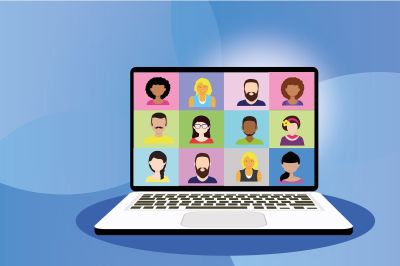A phenomenon called Moral Licensing
Moral licensing is a phenomenon that occurs as follows:
A person who serves a strong social norm for moral action, e.g. by acting particularly tolerant or environmentally friendly, subsequently loses the desire to continue acting morally. In the worst case, moral behavior even turns into unfair or antisocial behavior.
Science cannot yet provide a precise and unambiguous explanation for this phenomenon, which has been proven many times in studies. Let us therefore take a look at the three most common variants.
1. The moral “buy yourself free card”
For our next city trip with friends, we would like to travel comfortably and in a time-saving manner from Cologne to Vienna, and so we get on a plane.
One of us has a guilty conscience because this trip will have a negative impact on his carbon footprint. But fortunately, the airline already has the right offer ready and offers him to set his CO2 footprint back to zero in exchange for additional money. Need meets offer. So far so good.
2. The moral account
Some people fill their moral account with certain products from the supermarket, with a donation to a charitable institution or with exceptionally green electricity. And in doing so, they buy the feeling that they don’t have to take morals quite so seriously when it comes to other things in life. Most of the time, we don’t perceive it that way, and I don’t want to deny anyone a deep conviction for good things. From my point of view, it only becomes difficult when it is no longer about the good thing itself, but about one’s own ego.
3. The moral identity
It is often the case that commitment to a good cause is replaced by a pure focus on one’s own moral identity. A company owner who decides to introduce a company-wide, gender-neutral language catalog and to reprimand violators may consider himself a progressive spirit.
However, if it then comes out that the gender pay gap in his company is around 20% across all full-time positions, the question arises as to how much he is concerned here with “progress” and how much with polishing his own moral identity or the externally perceived identity of his company. In my view, this is a practical example of the most unpleasant form of moral licensing.
Finally, my personal recommendation on how you can filter out honest people from fake moral actions. The honest good cause, be it for others or the environment, focusses on the cause itself and less on someone getting applause and praise for being "such a good person" by doing X,Y or Z. Of course it's perfectly fine to talk about doing good things, helping others, donating money and so on. The problem arrises when these things become an intentional investment rather than an act of kindness.
More articles
by Antoni

How to reach your goals with CORE Questions
When it comes to personal and professional development, the CORE questions have emerged as a powerful tool for self-reflection and goal-setting. These four fundamental inquiries—Challenge, Outcome, Resources, and Effect—provide you with a systematic approach to show you the way from problem focus to goal focus.
By delving into each aspect, you can gain more clarity, define your objectives, mobilize your resources, and evaluate the impact of your actions. In this blog post, we will explore the significance of the CORE questions and how they can guide you towards accomplishing your aspirations.
by admin

Questioning Techniques: How to use SPIN Questions
Questioning techniques are an essential element in my coaching kit. Today I am therefore starting the ABC of Questioning Techniques, in which further questioning techniques will follow in the coming weeks. Let's start with the SPIN questions - SPIN stands for situation questions, problem questions, implication questions and benefit questions. In this blog post you will find out where SPIN can help you and how it works in a sales meeting with a client.
Read more … Questioning Techniques: How to use SPIN Questions
by admin

How to solve team conflicts in seven steps
I often come across ongoing conflicts in teams of all kinds. And while a certain amount of conflict in the team can contribute to the achievement of goals, some conflicts develop in a destructive direction. Both openly acted out conflicts as well as hidden and subliminal conflicts then inhibit cooperation and thus also the quality of results in day-to-day business or in projects. In this blog article, I explain my method for effectively resolving conflicts in the team.
by admin

What we can learn about ourselves from moral licensing
Today we are talking about the psychological phenomenon of moral licensing. In the following, you will learn what it is all about and how I assess the different types.
Read more … What we can learn about ourselves from moral licensing
by admin

Question Storming - how the method works best
Today's blog article is about Question Storming - one of my favorite methods in workshops. Unfortunately, the method is often used incorrectly and thus does not reach its full potential. In this article you can read how you can do it better in your organization and your team.
by admin

Leadership live webinar
Today I'd like to introduce you to my regular live webinar for people in leadership positions on the topic of " solving problems effectively". In this article you can find out what the webinar is about, what's the added value for your, why I'm holding it live and how you can register.
by admin

Four approaches to a happy life
Today we are dealing with a classic question that many well-intentioned and poorly made guidebooks unfortunately come up with. The question of our own satisfaction and how we can best achieve and maintain a "happy state". Here we go...
by admin

How a Coaching in India broadens your horizon
Today I share my latest international coaching project with you.
20 coaching sessions with different people from India. In this article I will share my thoughts on why I highly recommend everyone to get exposed to a completely different environment than the one you are used to, both privately and professionally.
by admin

How to solve problems with perspective changes
Today let's take a look at a popular tool that you can expect to find in every good coaching toolbox - change of perspective. I will go into what the change of perspective is all about, how you can make the best use it for yourself and how a "cerebral cinema" for two practical examples looks like.
by admin

Successful investments using the mountain metaphor
Today we are talking about investing money in the stock market. And specifically about the emotional challenges of investing money. This aspect is often underestimated - which is why this article teaches you what shouldn't happen to you and your investments on the stock market. Of course, this is not investment advice, but only my personal opinion as a private investor and coach.
Read more … Successful investments using the mountain metaphor
by admin

How we can learn to make the best decisions
We make several thousand decisions a day - which is quite a lot, in fact. We make most of them without any significant cognitive effort, virtually automatically. Other decisions are the result of thorough analysis and thoughtful evaluations. And sometimes we postpone decisions to infinity. In this blog post you can find about out what we can learn from our decision-making styles and you'll find some specific examples from the world of professional sports (Golf and football/soccer)...
